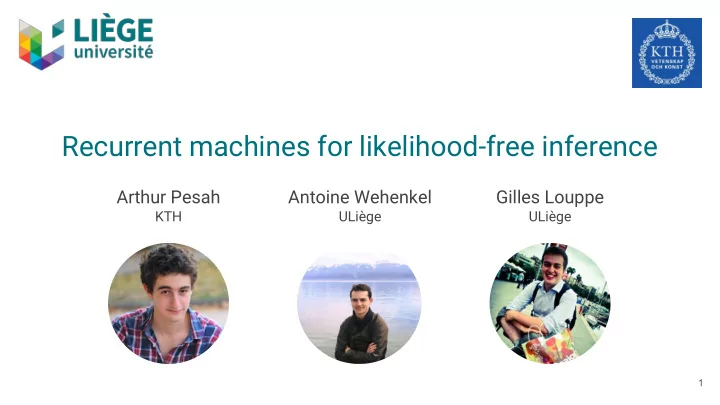

Recurrent machines for likelihood-free inference Arthur Pesah Antoine Wehenkel Gilles Louppe KTH ULiège ULiège 1
Likelihood-free Inference 2
Likelihood-free inference: what? Parameters Goal Finding the parameters corresponding to real data How? Maximum likelihood Simulator Likelihood But... We don’t have the likelihood! Real data 3
Likelihood-free inference: when? 4
Likelihood-free inference: when? Coefficients of the differential equations. Example: Population biology ODE Solver The evolution of a population can be modelled by a differential equation that can be solved by a simulator (numerical solver). 5
Likelihood-free inference: when? Physical constants (mass of particles, Particle Physics strength of interactions, etc.) Particle collisions simulator (e.g. Geant4) Particle accelerators (like the LHC) Detectors response after a collision produce particle collisions and observe the resulting particles with detectors. 6
Likelihood-free inference: how? 7
Likelihood-free inference: how? What can we do? 8
Likelihood-free inference: how? Idea 1: choose a random parameter and simulate it Problem: nothing to do next 9
Likelihood-free inference: how? Idea 2: sample several parameters from a distribution and simulate them Proposal distribution: 10
Likelihood-free inference: how? Then: comparing the different simulated data and choosing an appropriate direction Proposal distribution: 11
Likelihood-free inference: how? How to choose the best direction in the parameter space? ● Some algorithms rely on a predefined update rule and a handcrafted similarity measure between the generated and the real samples. ● Why not learning this optimization procedure and the similarity measure?
Likelihood-free inference with meta-learning 13
Likelihood-free inference with meta-learning Before meta-training After meta-training 14
ALFI: Automatic Likelihood-free Inference Principle : learning a descent using an Recurrent Neural Network RNN 15
Likelihood-free inference with meta-learning Simulator Simulator Simulator Simulator Simulator Simulator Generate a meta-dataset 16
Likelihood-free inference with meta-learning Simulator ALFI Simulator ALFI Simulator ALFI Simulator ALFI Simulator ALFI Simulator ALFI Generate a meta-dataset Automatic Likelihood-Free Inference (the name of our RNN-based machine) 17
ALFI: Automatic Likelihood-free Inference Principle : learning a descent using an Recurrent Neural Network Problem : 1 Step : 1/3 18
ALFI: Automatic Likelihood-free Inference Principle : learning a descent using an Recurrent Neural Network Problem : 1 Step : 2/3 19
ALFI: Automatic Likelihood-free Inference Principle : learning a descent using an Recurrent Neural Network Problem : 1 Step : 3/3 20
ALFI: Automatic Likelihood-free Inference Principle : learning a descent using an Recurrent Neural Network Problem : 200 Step : 1/3 21
ALFI: Automatic Likelihood-free Inference Principle : learning a descent using an Recurrent Neural Network Problem : 200 Step : 2/3 22
ALFI: Automatic Likelihood-free Inference Principle : learning a descent using an Recurrent Neural Network Problem : 200 Step : 3/3 23
Results With a known likelihood function: Poisson: With an unknown likelihood function: Weinberg: Electron muon collision. ● ● Parameters are the beam energy and the fermi constant. Observations are the ● angle between the two muons. 24
Limitations and future work Limitations ● Scaling it up on more complex simulators ● Learning intensive in the number of simulator calls Future work ● Getting a better understanding of the optimization procedure learned by ALFI: ○ Is it comparable to other existing methods? ○ Does it generalize to other simulators? ● Training the model on more complex simulators and compare it to state-of-the-art likelihood-free inference methods 25
Conclusion Thanks ArXiv: 1811.12932 - Recurrent machines for likelihood-free inference GitHub: github.com/artix41/ALFI-pytorch 26
Recommend
More recommend